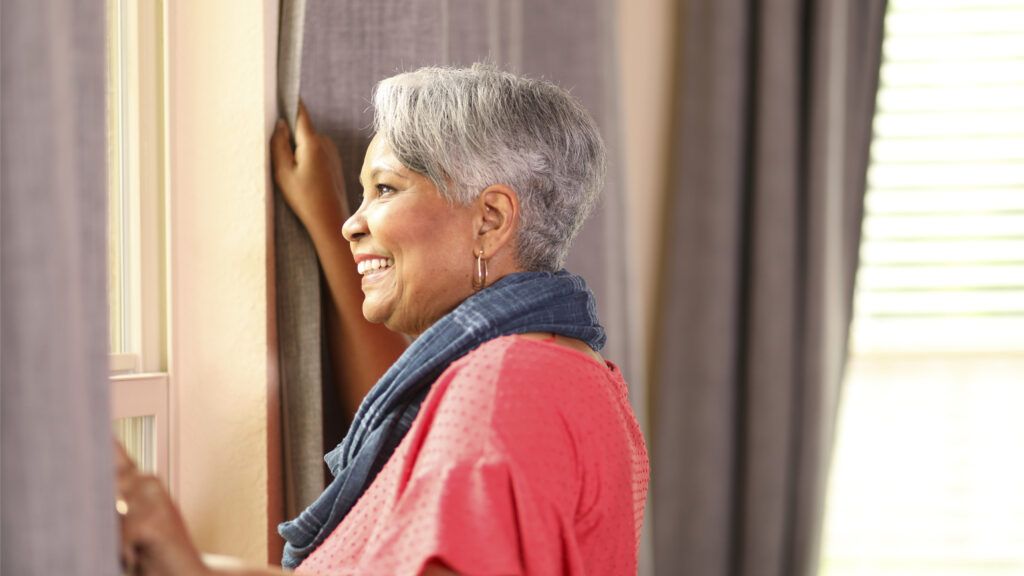Julie Hayes is the Content Manager at Benjamin Rose Institute on Aging.
During the sweltering days of summer, it can be far easier to hunker down in the air conditioning than to venture into the great outdoors. During the COVID-19 pandemic, you may have developed a stay-inside habit that’s hard to break. But when it comes to your older loved one, it can be difficult to stay cool even indoors.
According to the CDC, people aged 65 and older are at an increased risk for heat-related health problems such as heat stress, heat intolerance and difficulty regulating body temperature. Certain chronic health conditions and medications can affect temperature regulation or the ability to naturally produce sweat to cool the body down. Hot outdoor conditions are obviously an issue, but it’s important to pay careful attention to indoor areas that can get too warm and to proper habits that promote cooling when at home.
You can help your loved one to stay cool by encouraging him or her to:
- Drink plenty of fluids
Everyone knows how important it is to stay hydrated, right? However, according to WaterLogic, Americans are only drinking about 43 percent of the water they should be consuming on a daily basis. In addition, the CDC notes that older adults are among the populations who tend to drink water below the national average.
The National Academies of Sciences, Engineering, and Medicine recommends a daily fluid intake for adults of about 15.5 cups for men and 11.5 cups for women, though in some cases daily intake should be reduced, such as for those with conditions like kidney failure where the body retains water. Certain foods that contain water can provide fluids, but make sure that your loved one regularly drinks water or beverages that contain water, like fruit juice. Keep in mind that coffee, hot tea, caffeinated beverages and alcohol can have a diuretic effect, causing the body to lose fluid. They should be kept to a minimum in the summer heat.
- Dress appropriately
When you’re indoors, it’s easy to disregard proper summer wear, but clothing made from breathable fabrics can help prevent your loved one from getting overheated indoors. Loose fitting pieces in natural fabrics such as cotton and linen help older adults to stay cool at home.
- Maintain optimal home cooling
Whenever air-conditioning and fans are going, shut all windows and doors to areas that aren’t being used to keep cool air from escaping. Cracks beneath doors can also be plugged up with towels or insulation strips to keep temperatures optimal.
When it’s bright outside, you might also want to close the blinds, to keep too much sunlight from overheating the home.
- Minimize appliance use
Ovens and stoves can put out an abundance of heat. When they’re turned on for too long, they can make even an air-conditioned kitchen feel oppressive.
In the heat of summer, it’s a good idea to forgo recipes that call for the use of a stove. If a recipe does require the oven or stove, run exhaust fans, if you have them, to draw heat and steam from the kitchen while preparing the meal.
- Use cold compresses
Applying cold compresses allows you to lower body temperature in a fast and effective manner. Your loved one can place the compresses on his or her wrists, neck or temples, which should quickly distribute the cooling effects all over the body.
Good substitutes are chilled water bottles, bagged ice cubes or a bag of frozen vegetables.
- Avoid too much movement
Even though exercise is important for your loved one, too much movement in the summertime can cause overheating. When the temperature’s extremely high, it’s advisable to lie low. If it’s impossible to avoid a lot of movement on a particularly hot day, have your loved one follow up with a cool shower or bath to regulate the body temperature.
- Create a cool sleep environment
Although our bodies naturally gradually decrease in temperature as the day progresses, certain things can actually increase body temperature. If your loved one has moved around a lot during the day or takes a medication that affects temperature, it may be more difficult to get to sleep or stay asleep through the night because he or she is hot and uncomfortable.
It’s important to keep the bedroom conducive to sleep by setting the thermostat at an optimal temperature or using fans to circulate air. Sheets and mattresses that are specially designed to be breathable or temperature regulating can also promote good sleep.
If your loved one starts to feel faint, dizzy, fatigued, agitated, nauseated, confused or feverish in hot weather, contact his or her physician, especially if the symptoms persist for more than an hour. Heat exhaustion can lead to heat stroke, which can be life-threatening and should be treated as immediately as possible.






